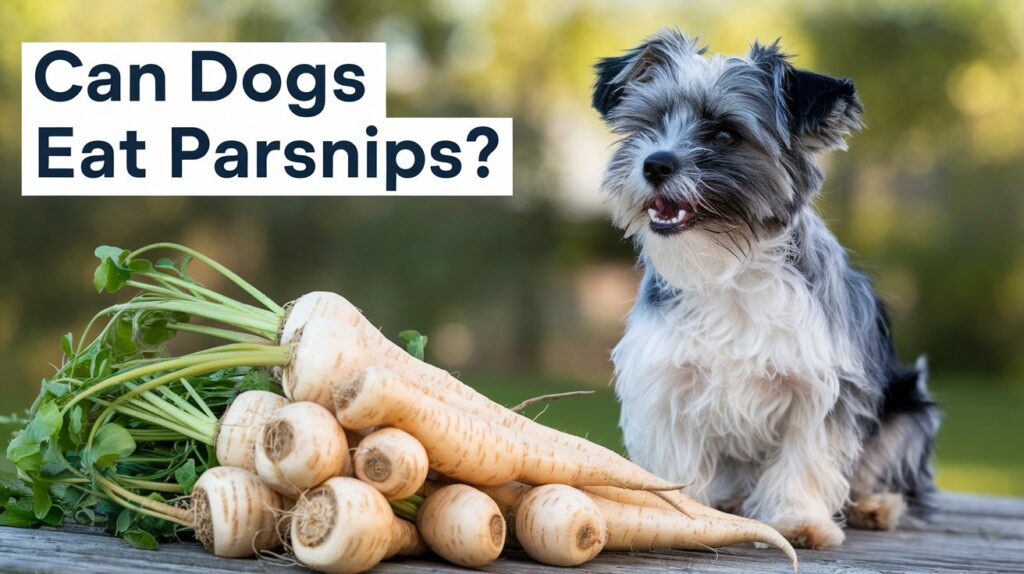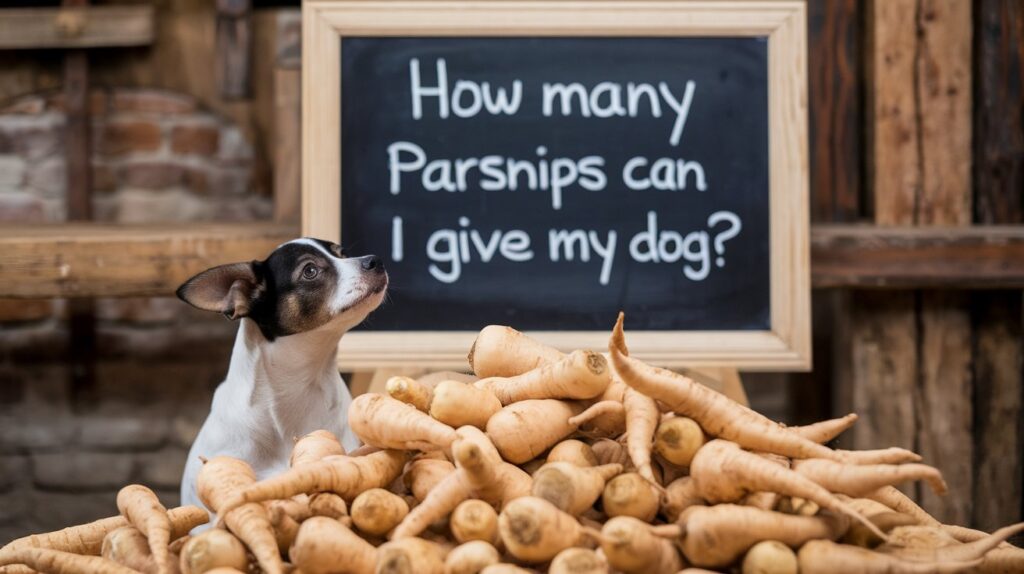- Homepage
- Dogs Nutrition
- Can Dogs Eat Parsnips? Health Benefits & Risks 2025
Can Dogs Eat Parsnips? Health Benefits & Risks 2025

Table of Contents
ToggleCan Dogs Eat Parsnips?
Yes, dogs can eat parsnips in moderation and can even be a healthy addition to your dog’s diet. Parsnips are rich in vitamins C and B6, folate, and fiber, all contributing to overall well-being. This root vegetable is also low in calories and fat, making it a good treat option for dogs who need to maintain a healthy weight.
However, it’s best to serve parsnips cooked and cut into small pieces to prevent choking or digestive issues. Avoid adding seasonings, oils, or butter, as these can harm dogs. Always introduce new foods slowly and consult your veterinarian if you have concerns.
Are Parsnips Safe for Dogs?
Yes, parsnips are generally safe for dogs to eat in moderation. They contain essential nutrients like vitamins C and B6, fiber, and potassium, which can contribute to your dog’s overall health. However, like with any new food, it’s crucial to introduce parsnips slowly to your dog’s diet and monitor them for any signs of allergies or digestive issues.
Health Benefits of Parsnips for Dogs
Parsnips offer several health benefits for dogs, making them a nutritious snack option. Here’s a closer look at the nutritional value of parsnips:
1. Rich in Vitamins and Minerals
Parsnips are packed with vitamins such as vitamin C, B6, and folate. These vitamins play an essential role in boosting your dog’s immune system, promoting healthy brain function, and improving cell metabolism.
2. High in Fiber
The high fiber content in parsnips aids in healthy digestion. It helps regulate your dog’s bowel movements and can be beneficial for dogs with occasional constipation.
3. Antioxidant Properties
Parsnips contain antioxidants that help combat free radicals in your dog’s body. They are helpful against chronic diseases and support Healthy aging.
4. Low in Calories and Fat
For dogs that need to maintain or lose weight, parsnips can be an excellent low-calorie treat. They are also low in fat, making them a healthy option for dogs with specific dietary restrictions.
5. Supports Heart Health
The potassium in parsnips can help maintain a healthy heart by regulating blood pressure and reducing the risk of heart disease.

Potential Risks of Feeding Parsnips to Dogs
While parsnips are safe for most dogs, there are a few considerations to keep in mind:
1. Allergies and Sensitivities
Some dogs may be allergic or sensitive to certain vegetables, including parsnips. Symptoms of an allergic reaction may include itching, swelling, or digestive upset. If you notice any of these signs after feeding your dog parsnips, discontinue use and consult your veterinarian.
2. Digestive Issues
Feeding too many parsnips at once can cause gastrointestinal issues like gas, bloating, or diarrhea. To prevent this, introduce parsnips gradually and serve them in small portions.
3. Choking Hazard
Raw parsnips can be a choking hazard, especially for small dogs. Always chop them into small, bite-sized pieces and consider cooking them to soften the texture.
How to Prepare Parsnips for Dogs
When serving parsnips to your dog, it’s essential to prepare them in a safe and digestible manner. Here are some tips on how to do so:
1. Cooked vs. Raw
Cooked parsnips are easier for dogs to digest compared to raw ones. Boiling, steaming, or baking parsnips without any added salt or seasoning is the best way to serve them. Cooking also softens the vegetable, reducing the risk of choking.
2. Chopped or Mashed
Whether raw or cooked, make sure to chop parsnips into small pieces or mash them to prevent choking. For smaller dogs, mashed parsnips are ideal.
3. Avoid Adding Seasonings
Never add any seasonings, oils, or butter when preparing parsnips for your dog. These additives can upset your dog’s stomach or be harmful.

How many parsnips Can I Give My Dog?
Moderation is key when feeding parsnips to your dog. For small dogs, a few small pieces once or twice a week should be sufficient. Larger dogs can have a slightly larger portion, but it’s always wise to start with small amounts to gauge your dog’s reaction.
Portion Guide for Different Dog Sizes:
- Small Dogs: 1-2 small pieces per serving
- Medium Dogs: 3-4 small pieces per serving
- Large Dogs: 4-6 small pieces per serving
If you want to include parsnips as a regular part of your dog’s diet, consult your veterinarian to ensure they align with your pet’s specific nutritional needs.
Can Puppies Eat Parsnips?
Puppies have delicate digestive systems, so it’s best to be cautious when introducing new foods like parsnips. While parsnips are not toxic to puppies, they should only be fed in tiny amounts and cooked form. Always consult your veterinarian before offering parsnips to your puppy to ensure their safety.
Alternatives to Parsnips for Dogs
If your dog doesn’t seem to like parsnips or you’re looking for other healthy vegetable options, consider these alternatives:
1. Carrots
Carrots are similar to parsnips and offer a slightly sweeter taste. They’re rich in beta-carotene, which is good for your dog’s vision and skin.
2. Sweet Potatoes
They are full of vitamins A and C and are high in fiber. They can be a nutritious treat when cooked and served plain.
3. Pumpkin
Pumpkin is another low-calorie option that’s gentle on the stomach and can help with digestive issues.
When to Avoid Feeding Parsnips to Dogs
While parsnips are safe for most dogs, there are specific situations where they should be avoided:
- If your dog has a history of kidney issues: Parsnips are high in potassium, which can aggravate kidney conditions.
- If your dog has a sensitive stomach: Dogs with digestive sensitivities may not tolerate parsnips well.
If your dog falls into any of these categories, consult your veterinarian before adding parsnips to their diet.
Conclusion: Can Dogs Eat Parsnips
Parsnips can be a healthy and tasty addition to your dog’s diet when served in moderation. They’re packed with vitamins, minerals, and fiber, making them a nutritious treat that supports your dog’s overall health. However, always be mindful of the quantity and preparation method to ensure your dog enjoys parsnips safely.
FAQs: Can Dogs Eat Parsnips
- How much parsnip can dogs eat?
Small dogs can have 1-2 small pieces, while larger dogs can have 3-6 pieces, served once or twice a week. - What vegetables can dogs not eat?
Dogs should avoid onions, garlic, leeks, chives, and mushrooms, as these can be toxic and cause health issues. - What are the best vegetables for dogs?
Carrots, sweet potatoes, green beans, broccoli, and pumpkin are some of the best vegetables for dogs, providing essential nutrients and fiber. - Are parsnip leaves toxic to dogs?
Yes, parsnip leaves can be toxic and cause skin irritation or digestive issues. It’s best to only feed the root and avoid the leaves.

Jahanzaib Kaleem is a passionate and knowledgeable pet writer and veterinarian dedicated to enhancing the well-being of pets and educating pet owners around the world. With years of experience in veterinary medicine and a deep love for animals, Jahanzaib combines his medical expertise with a flair for writing to deliver insightful and practical advice on pet care.




















